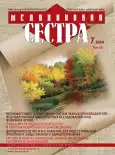The compatibility of the components of the vacuum blood collection system is the key to successful and safe venipuncture
- Authors: Kharashun E.A.1, Kovalevskaya S.N.2
-
Affiliations:
- State Budgetary Healthcare Institution «A.K. Yeramishantsev City Clinical Hospital, Moscow Health Department»
- Academician I.P. Pavlov First St. Petersburg State Medical University
- Issue: Vol 26, No 7 (2024)
- Pages: 26-32
- Section: Profession: theory and practice
- URL: https://journal-vniispk.ru/0025-8342/article/view/267259
- DOI: https://doi.org/10.29296/25879979-2024-07-04
- ID: 267259
Cite item
Abstract
When taking blood from a vein for laboratory tests, nurses may have situations related to the use of vacuum systems (VS) from different manufacturers. Most often this is due to the requirements of tender purchases, when vacuum containers (VC) and double-sided needles are placed in different LOTs. To understand the depth of the problem, we developed a questionnaire and conducted an online survey of 188 nurses of hospitals in Moscow, which showed that almost half of the respondents (42.2%) experienced difficulties related to the compatibility of components from different manufacturers, which negatively affected the test results, increased direct and hidden costs of the medical organization.
The authors analyze the results of the survey and give recommendations on how to avoid such problems: use components of vacuum blood collection system from one manufacturer or, if this is not possible, conduct compatibility testing of the components before use. The authors suggest ways to check for compatibility, referring to domestic and international recommendations. These measures will ensure safer and more effective venipuncture.
Keywords
Full Text
##article.viewOnOriginalSite##About the authors
Elena A. Kharashun
State Budgetary Healthcare Institution «A.K. Yeramishantsev City Clinical Hospital, Moscow Health Department»
Author for correspondence.
Email: khoroshun_79@mail.ru
ORCID iD: 0009-0007-3326-6277
Medical Laboratory Technician of State Budgetary Healthcare Institution
Russian Federation, Moscow
Svetlana N. Kovalevskaya
Academician I.P. Pavlov First St. Petersburg State Medical University
Email: khoroshun_79@mail.ru
ORCID iD: 0000-0002-6898-286X
Assistant of the Department of Clinical Laboratory Diagnostics with a course of molecular medicine
Russian Federation, St. PetersburgReferences
- EFLM WG-Preanalytical phase opinion paper: local validation of blood collection tubes in clinical laboratories / G. Lippi, M.P. Cornes, K. Grankvist et al. // Clin. Chem. Lab. Med. 2016; 54 (5): 755–760. doi: 10.1515/clm-2015-1274
- Gorodetsky B.G., Stankevich L.I., Comparative assessment of the quality of vacuum systems for blood collection during coagulological clinical diagnostic studies. LPU Laboratory, special issue. 2018; 13: 21–23.
- Khorovskaya, L.A. Kovalevskaya, S.N., Vybornova, N.B., Kallner, A. Does the choice of vacuum tubes affect the results of hematology studies? Scientific notes of St. Petersburg State Medical University named after Academician I.P. Pavlov. 2010; XVII (4): 23–26.
- Organization of the preanalytical stage in the centralization of laboratory research: methodological recommendations. A.A. Kishkun, A.J. Gilmanov, T.I. Dolgikh et al. Moscow, 2014. 112 p.
- Practical recommendations on taking venous blood samples for laboratory research. Kovalevskaya S. N., Zybina N. N., Guseva I. A., etc. – Moscow ‒ Tver: LLC Publishing House Triada, 2021 – 52 p.
- Plebani M, Caputo M, Giavarina D, Lippi G. Methodological notes on acquisition and use of close evacuated systems for collection, handling and storage of venous blood samples for laboratory diagnostics. Biochim Clin 2013; 37: 244–252
- A.-M. Simundic, K. Bolenius, J. Cadamuro et al. Joint EFLM-COLABIOCLI Recommendation for venous blood sampling / Clin. Chem. Lab. Med. 2018; 56 (2): 2015‒2038.
- GOST R 59778-2021. Procedures for taking venous and capillary blood samples for laboratory tests: approved and put into effect by Order of the Federal Agency for Technical Regulation and Metrology dated October 21, 2021; 1212-art.: introduced for the first time: date of introduction 04/01/2022 / developed by the Association of Specialists and Organizations of Laboratory Service «Federation of Laboratory Medicine». Moscow: IS «Techexpert: 6th generation» Intranet, 2021. 27 p.
- FDA MAUDE Database [Electronic resource] ‒ access mode https://fda.report/MAUDE/
- GOST R ISO 6710-2021. The national standard of the Russian Federation. Containers for venous blood sampling are disposable. Technical requirements and test methods: approved and put into effect by Order of the Federal Agency for Technical Regulation and Metrology dated October 27, 2021 No. 1348-art.: introduced for the first time: date of introduction 04/01/2022 / Prepared by the Association of Specialists and Organizations of the laboratory service «Federation of Laboratory Medicine». – Access from the Consultant Plus legal reference system.
Supplementary files












